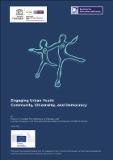| dc.contributor.author | Chaskin, Robert J. | |
| dc.contributor.author | McGregor, Caroline | |
| dc.contributor.author | Brady, Bernadine | |
| dc.date.accessioned | 2018-08-29T10:42:16Z | |
| dc.date.available | 2018-08-29T10:42:16Z | |
| dc.date.issued | 2018 | |
| dc.identifier.citation | Chaskin, Robert J., McGregor, Caroline, & Brady, Bernadine (2018). Engaging urban youth: community, citizenship, and democracy. Galway: UNESCO Child and Family Research Centre, National University of Ireland Galway. | en_IE |
| dc.identifier.isbn | 978-1-905861-52-1 | |
| dc.identifier.uri | http://hdl.handle.net/10379/10016 | |
| dc.description.abstract | It is well known that disadvantaged youth in urban environments often experience marginalisation
and disenfranchisement that can lead to serious consequences for them, their families, and the
wider society. Such disenfranchisement is reinforced by negative media portrayals and punitive
policies that treat certain urban youth as threats to be controlled rather than as young people
with the agency and potential to contribute effectively to society. At the same time, it is also
well known that successfully engaging young men and women in the institutions, communities,
and contexts in which they live and building their capacity as social actors can be a critical
factor in their positive development as individuals, enhance their future role as citizens, and
promote their current positive contribution to these same contexts and institutions (Flanagan,
2015; Sherrod, Torney-Purta, and Flanagan, 2010; Yates and Youniss, 1999; McLaughlin, Irby, and
Langman, 1994).
Concerns about the extent to which young people – especially young people at the margins –
are increasingly disengaged from civic and political life have been prominent in contemporary
discourse and are an increasingly common impetus for youth policy. At the supranational level,
a number of youth-oriented policy frameworks developed by UN agencies and at the European
Union, in particular, have identified youth civic and political engagement as important goals
in themselves and have promoted youth engagement as a contributing factor to both youth
development and broader societal change (Chaskin, McGregor, and Brady, 2018). There has
been a similar focus at the national level in some states, particularly in Europe, including the
Republic of Ireland, Britain, and Northern Ireland (ibid.).
Effectively engaging disadvantaged urban youth, however, can be difficult, and the factors
that contribute to these challenges are complex and multilayered. Indeed, there is still relatively
little known empirically about the specific contexts, strategies, and mechanisms through which
disadvantaged urban youth can be most effectively engaged and the potential effects such
engagement can have on youth development, social change, and long-term citizen engagement.
We also know little about how such interventions can best be delivered, taking into account the
diverse social, economic, and political circumstances in which such young men and women reside,
particularly in the context of rapidly changing urban contexts. This is particularly true with regard
to the engagement of young people as citizens – both civic and political actors with autonomy
and responsibility for contributing to the common good. And we know little about how well
the arguments and interventions proposed and supported by policy frameworks at the national
and supranational level are reflected in and advanced by practice on the ground; how policyfocused
professionals, civil society leaders, and front-line practitioners perceive the purpose of
youth engagement, frame the challenges they face, and respond to them; or how young people
themselves interpret their place in the world and the opportunities, barriers, and potential responses
to constraints on their civic and political engagement. | en_IE |
| dc.description.sponsorship | The project has received funding from the European Union’s Horizon 2020 research and innovation programme under the Marie Skłodowska-Curie grant agreement no. 661541. | en_IE |
| dc.format | application/pdf | en_IE |
| dc.language.iso | en | en_IE |
| dc.publisher | UNESCO Child and Family Research Centre, National University of Ireland Galway | en_IE |
| dc.rights | Attribution-NonCommercial-NoDerivs 3.0 Ireland | |
| dc.rights.uri | https://creativecommons.org/licenses/by-nc-nd/3.0/ie/ | |
| dc.subject | Engaging urban youth | en_IE |
| dc.subject | Community | en_IE |
| dc.subject | Citizenship | en_IE |
| dc.subject | Democracy | en_IE |
| dc.title | Engaging urban youth: community, citizenship and democracy | en_IE |
| dc.type | Report | en_IE |
| dc.date.updated | 2018-08-29T10:00:00Z | |
| dc.local.publishedsource | http://www.nuigalway.ie/cfrc/publications/ | en_IE |
| dc.description.peer-reviewed | peer-reviewed | |
| dc.contributor.funder | Horizon 2020 | en_IE |
| dc.contributor.funder | H2020 Marie Skłodowska-Curie Actions | en_IE |
| dc.internal.rssid | 14543943 | |
| dc.local.contact | Bernadine Brady, School Of Political Science, & Sociology, Nui Galway. 5759 Email: bernadine.brady@nuigalway.ie | |
| dc.local.copyrightchecked | Yes | |
| dc.local.version | PUBLISHED | |
| dcterms.project | info:eu-repo/grantAgreement/EC/H2020::MSCA-IF-EF-ST/661541/EU/Engaging Urban Youth: Community, Citizenship, and Democracy/CMCG | en_IE |
| nui.item.downloads | 364 | |


